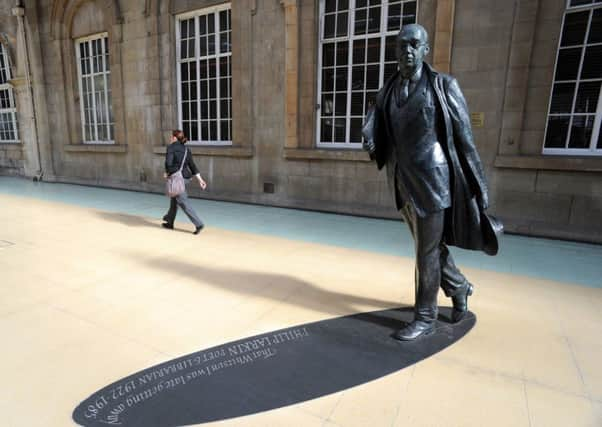YP Comment: Hull and the art of the possible. Proud city's cultural revolution


For too long, this was a port city which residents wanted to leave at the first opportunity because of a poverty of aspiration. Now, as Hull prepares for its year in the spotlight as the UK City of Culture, it promises to be one of the places to visit in 2017 thanks to an innovative programme of arts which honours the heritage of literary legends like Larkin while also showcasing the city’s renewed vibrancy.
How times change. A city which did not always help itself when it was languishing in the economic doldrums as traditional manufacturing industries collapsed and successive governments turned their backs on the resulting social scars, Hull is in the process of transforming itself now that the economic tide is turning.
Advertisement
Hide AdAdvertisement
Hide AdFifteen years ago, projects like The Deep – and the opening of what is now known as the KCOM Stadium – were major landmarks and showed what could happen if Hull political, civic and business leaders became more outward and dynamic in their approach.
Now they have taken the art of the possible to a whole new level with a simply breathtaking programme of events which will demonstrate that this region’s cultural heritage is an intrinsic part of the wider economy.
Yet, while City of Culture is already changing perceptions and winning over the more cynical Hullonians who are more used to a cultural diet of rugby league and football, the real test will be whether it attracts even more jobs – £1bn has been invested in the city over the past three years as it becomes a green energy hub – and whether it can change lives on those run-down estates where unemployment, poverty and self-pity are still rife. As Larkin himself wrote: “Life has a practice of living you, if you don’t live it.” How apt.
Flood of concerns
NOT only is the Government still dragging its feet over last winter’s floods as West Yorkshire council leaders consider how to respond more quickly, and effectively, to future emergencies, but it also defies belief that so many people are still prepared to purchase of homes in flood-risk areas.
Advertisement
Hide AdAdvertisement
Hide AdAccording to Yorkshire insurance giant Aviva UK, 19 per cent of prospective purchasers in this county would take that risk. This, believe it or not, is the good news. The national average is 23 per cent – even though building on flood plains, and other susceptible areas, is already proven to be a false economy.
Proof that Ministers, and planners, need to look again at the issue of land availability as the repercussions of the national housing shortage continue to reverberate, it also suggests that the Environment Agency needs to become even more integral to the planning process.
As well as a debate about whether this body should have the right to veto those developments where the risks are too great, it appears that local plans – the framework which councils use to determine applications – does not make sufficient account for the effects on drainage, and surface water, if a succession of schemes are given the go ahead without any significant infrastructure improvements.
Given the difficulties that homeowners and businesses still have when it comes to accessing affordable insurance, perhaps the time has come for a levy to be imposed on all future developments over a prescribed size – with the money being put towards preventative measures. Either way, simply leaving matters to chance is not a water-tight planning policy.
Democratic duty
Advertisement
Hide AdAdvertisement
Hide AdSHOULD voting be a compulsory? Once again, this age-old question has been raised after it emerged that so-called ‘baby boomers’ cast four million votes more than younger ‘millennials’ at the last election.
Yet this premise, advocated by the Resolution Foundation, misses three points. Australian politics is no better off as a result of compulsory voting; responsible adults should not need reminding of their democratic duty and the main parties should be coming up with new ways to engage and energise the electorate.
What can be more onerous than picking up a pencil and placing a ‘x’ in a box once a year? It’s not too much to ask in return for this country’s liberty, is it?